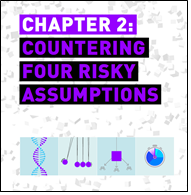 At the Tribeca Film Fest-based Games and Media Summit, new research revealed common weaknesses in achieving social impact with games—with tips for how to improve.
At the Tribeca Film Fest-based Games and Media Summit, new research revealed common weaknesses in achieving social impact with games—with tips for how to improve.
The research, “Chapter Two: Countering Four Risky Assumptions,” follows an earlier study, “A Fragmented Field.”It was conducted by researchers with feedback from a coalition of 25 “discussion collaborators”, including the Center for Media & Social Impact, and funded by the Packard Foundation. Prof. Benjamin Stokes, a CMSI research fellow and professor in the School of Communication, was a lead researcher.
The four “risky” research assumptions researchers found:
When funding is scarce, delay ‘research design’ and research. Don’t wait, the report urges; build the “design of research” right into the creative process, and iterate that design along with the game itself. “Good games must be balanced; if the research comes too late, they will not be good games — there has to be a formative process,” said Stokes.
Research is separate from design and conducted externally. Uh-uh. Game designers actually do research on the fly all the time. No game designer would launch a game without testing it first, both for playability and impact. “We’re saying to designers: recognize your own inner researcher,” said Stokes. Game designers and researchers can do more to work together, and learn together. More recognition is also due to formative research—research that helps you improve the game design. And approach the budget for research in a strategic way, not a fixed cost.
“Some designers have become skeptical of research because the wrong kind is genuinely distracting, so today we really need more research tied closely to better design,” said Stokes.
The logic model is obvious. You think? Logic models explain why something had the effect it did. It probably isn’t obvious what caused what effect, actually. Usually in a game there’s a chain of causality, not a bullet. So be brave; articulate the steps by which a game takes a player from one state to another. Your logic may help you build a stronger game; lower misunderstandings among stakeholders; and might help someone else make a difference.
Mass media is the only way to scale. Welcome to digital disruption. In an era of profound digital disruption, games may be able to reach millions without being distributed by a major game company. In fact, you could think about scaling through localized participation. Games might also have an enormous impact in unexpected ways, like when youth or communities make their own.
